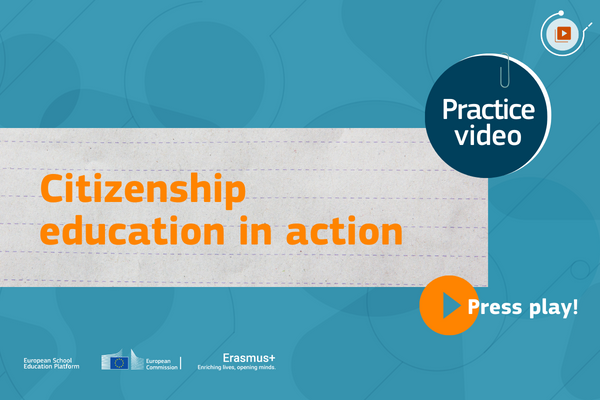Citizenship education in action

Collège Matteo Ricci, Brussels, Belgium
The Collège Matteo Ricci first opened its doors three and a half years ago. It's important to understand that this is a new school, and as a new school, we were able to decide how we wanted to work. We really thought it through before starting, and we said to each other: our school will be a Citizen School, a school where students will be able to share their thoughts; we will listen to them and take what they tell us into account, so we can move forward and keep building.
I was new to this school, so the whole Citizen School system was completely new to me, so I was quite hesitant at first, but I have been pleasantly surprised, in particular, by the fact that the students are listened to by management, by educators, by teachers and even by the other students in general, and that real investments are made in the students. One of the examples I can give you is the Matteo school board, which is made up of delegates and often includes the head teacher. The board discusses many different topics, either brought up by the teachers, or by the students themselves, to change the school in general.
We support teams in what we call the 'citizen transition': going from a school where young people are essentially passive, and where we consider what they need to learn to become good citizens later in life, to a school where young people have a place, where they are team partners, where school is not a service, but a shared adventure. For us, the citizen transition is this: moving on from a social project where we say to young people: “Receive, receive, one day you will give” to a social project where young people are told: “Come on, there's a place for you, and we can move forward together.” All the tools of a Citizen School, if you think about it, are ways to treat young people like partners.
My name is Valentine de Sellier, I am a maths teacher here at Matteo Ricci, and I am also responsible for the Citizen School. Our school has a charter that was co-created with students, with the objective of putting guidelines in place that allow us to respectfully coexist. So the charter is created in several stages. First of all, we come up with the guidelines, using what we call 'mini forums' in each class, and each class will define all the guidelines. Then on the basis of the individual charters in each class, one representative from each class –in my class it happens on Friday afternoon– goes to work out together what the guidelines for the school should be.
To combat violence and conflict in the school, we have established a 'Big Brother' and 'Big Sister' programme, so instead of going to educators, we will help the younger kids to come to us and confide in the 'big brothers' and 'big sisters', or in other words, students at the school who are role models for the other students.
On Thursday afternoon, we have workshops. We have a big list of different workshops, and we choose which ones we want to go to. For example, I run my own workshop, which also helps us be more accountable. Running your own workshop, and the fact that the teachers trust you to do more or less whatever you want, really empowers us and helps us become more mature.
They also help raise awareness of certain issues. There have been workshops on racism and harassment. Some students participate in these workshops to talk about their experiences and make us a little more aware and help us, because we are still young.
Our Citizen School also allows us to evaluate student behaviour. The system is called “Valio”. Valio as in 'to valorise' in French, and it’s important to understand that the idea is really to enhance and appreciate student behaviour. Students are able to self-assess based on a range of criteria linked to our charter, so that each student can reflect, take a break, reflect, and ask: “Where do I sit in relation to this point, this point, etc.”
Schools are places where “it’s possible”, where there is the hope to build oneself up, and to build a better world.
Additional information
-
Education type:School Education
-
Evidence:N/A
-
Funding source:Local
-
Intervention level:N/A
-
Intervention intensity:N/A
-
Participating countries:Belgium
-
Target audience:Head Teacher / PrincipalNot-for-profit / NGO staffParent / GuardianStudent TeacherTeacherTeacher Educator
-
Target audience ISCED:Lower secondary education (ISCED 2)Upper secondary education (ISCED 3)
